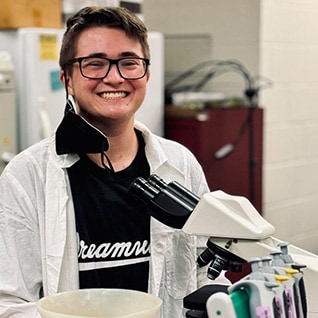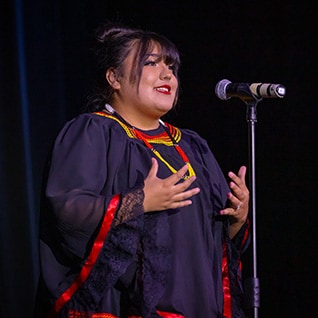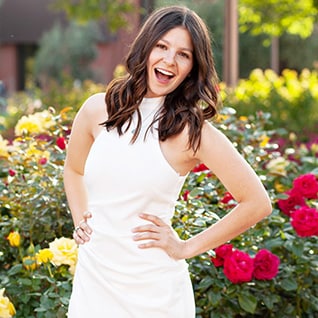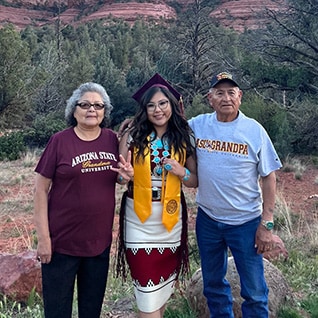/prod01/channel_2/media/mccms/content-assets/about/news/nov-dec-2024/1024X512_Native-American-Heritage-Month-doctor-patient-WF227746_0100.jpg)
November 27, 2024
November is a month when we celebrate the resilience, history, and cultures of Indigenous peoples. Mayo Clinic is proud to spotlight Native American students in our Pathway Programs — leaders and innovators paving the way for future generations.
Mayo Clinic's Native American Pathway Program (NAPP) addresses Native American health disparities by increasing the number of Native Americans in healthcare careers. This opportunity is a virtual five-week summer program that matches pre-medical students with mentors to help develop skills and strategies for the medical school admissions process.
Learn more about our scholars, including their Indigenous heritage, stories, and achievements, in the following Q&A's!
 Cass Condray
Cass Condray
Native American Pathway Program scholar
Could you share your cultural family background?
I’m a descendant of the Eastern Band Cherokee and Chickasaw. My family roots are in the Appalachian foothills, and summers with my grandparents in the Cherokee National Forest shaped me profoundly. They taught me traditional practices like shucking corn, shelling peas, and planting as a community. Some of my best memories are of riding in my uncle’s truck and enjoying peaches from our orchard. While I once envied kids at sleepaway camps, I now deeply value those summers and their cultural richness.
NAPP has significantly impacted my career aspirations. As an Indigenous person, I’ve seen firsthand the gaps in healthcare — like my dad’s close call with inadequate care and my auntie’s preventable cancer that worsened due to living in a healthcare desert. Before NAPP, I hadn’t met a Native physician, so the saying “you can’t be what you can’t see” really resonates. Meeting successful Indigenous physicians through NAPP has affirmed that I belong in healthcare too.
Is there an activity or project in NAPP that sparked your passion for healthcare?
I loved the medical simulations; they made me feel like a medical student, and I even use the OLD CARTS method now! The cultural grounding sessions with Dr. Baines and Drs. Benally-Thompson were equally inspiring, showing me that I don’t need to choose between my identity and medicine. Their insights on balancing identity have been invaluable.
 Emily Black
Emily Black
Native American Pathway Program scholar
Could you share your cultural family background?
Hesci! I am a proud member of the Seminole Nation of Oklahoma of the sweet potato clan and of the Tusekia Harjo band.
How has your involvement in the Native American Pathway Program (NAPP) influenced your career aspirations in healthcare?
The Native American Pathway Program (NAPP) increased my energy and passion to serve in a healthcare setting. This program allowed me to finally be able to fully picture myself in a setting that wasn’t created for me. By not only giving me the material support for this path, it has also given me the moral support that I was missing.
How has the NAPP curriculum’s focus on cultural identity enriched your learning journey?
One of the hardest aspects of being an Indigenous person in medicine is this idea that your indigeneity is not useful in this kind of setting. I struggled with this concept because I didn’t know how to handle these two aspects of myself. However, NAPP’s curriculum focusing on cultural identity allowed me not only to feel confident in my identity but it also taught me how powerful my identity is within this space. NAPP taught me that my indigeneity is the reason I will become an amazing healthcare provider.
 Molly Tomah
Molly Tomah
Native American Pathway Program scholar
Could you share your cultural family background?
I am Native American, and I belong to the Comanche Nation Tribe.
How has your involvement in the Native American Pathway Program (NAPP) influenced your career aspirations in healthcare?
Becoming a physician has always been my lifelong goal, though I initially faced some uncertainties about the various roles a physician plays within healthcare. However, my involvement in the Native American Pathway Program (NAPP) at Mayo Clinic has profoundly shaped and refined my aspirations. Conversations with Native providers have changed my perspective on the broader impact physicians can have beyond clinical practice, particularly through extracurricular and humanitarian efforts aimed at advancing medicine and reducing healthcare disparities. This experience has inspired me to approach medicine with a deeper sense of purpose and a commitment to serving underserved communities.
How has the NAPP curriculum’s focus on cultural identity enriched your learning journey?
The NAPP curriculum’s focus on cultural identity profoundly enriched my learning journey. Although I was born and raised in Arizona, my tribe and much of my family reside in Oklahoma, leaving me at times feeling distanced from my roots. Through NAPP I found a sense of belonging with such a diverse community of individuals from different tribal backgrounds. Listening to the stories of Native physicians and my peers was inspiring, and I felt as though I could relate to their experiences in medicine. Their journeys reminded me that the path to becoming a physician is rarely a straight line, and I felt a strong sense of empathy with their struggles and triumphs. This experience reaffirmed my commitment to pursuing a career grounded in cultural understanding and resilience.
 Chanel Chester
Chanel Chester
Native American Pathway Program scholar
Could you share your cultural family background?
I grew up in Phoenix, Arizona and I spent summers at my grandparents in Ganado, Arizona. I am interested in Dentistry so that I can use my hands to heal. I always liked the idea of using my hands. I watched my grandpa silversmith and my grandma weave. I still marvel at their creativity and beautiful hand dexterity. When I was young, I loved asking the question “why?”. I was exposed to dentistry when my paternal grandmother-Naali used to practice impressions on my cousins and I. I first used to dislike the process but as she continued to practice and allowed us to prep the material, it became so much fun. I found my passion in Dentistry braiding the love for science and creativity when I got to shadow the first female Navajo Dentist.
How has your involvement in the Native American Pathway Program (NAPP) influenced your career aspirations in healthcare?
I was involved in the Native American Pathway Program (NAPP) during the summer of 2024. NAPP was so much more than I had anticipated. I was teetering on the idea of applying to medical school or dental school. This program helped me make an informed decision and provided the appropriate resources for me to achieve my goals. We were able to explore careers with different health professionals. I had ultimately come to the decision that Dentistry was for me. When I had mentioned that was my decision, the program offered to pay for test-prep material so that I can succeed on the admission test. They also provided funding for us to attend the AISES (advancing indigenous students in STEM) conference. At this conference I networked and found two summer internships that I hope to get accepted to for next summer. The program helped me overcome a financial barrier that many other students like myself have faced. They also provided mentoring and a supportive community that many indigenous students may lack at the beginning of their journey. The program was immersed in cultural competency. The program allowed me to truly see myself as an indigenous healer through the field of Dentistry.
What has been the most challenging aspect of your NAPP experience, if any?
I think the most challenging part of the program was ending it. I met so many amazing people that I wish we could have regular meetings over the year while in school. I have made some lifelong peers and I know they are going to be amazing providers.
About the Office for Education Diversity, Equity, and Inclusion
At Mayo Clinic, the Office for Education Diversity, Equity, and Inclusion recognizes that the contributions of every individual is essential to success in patient care, education, and research. The office strives to maintain and further develop a learning environment in which individual differences are valued, allowing all staff and students to achieve their fullest potential.